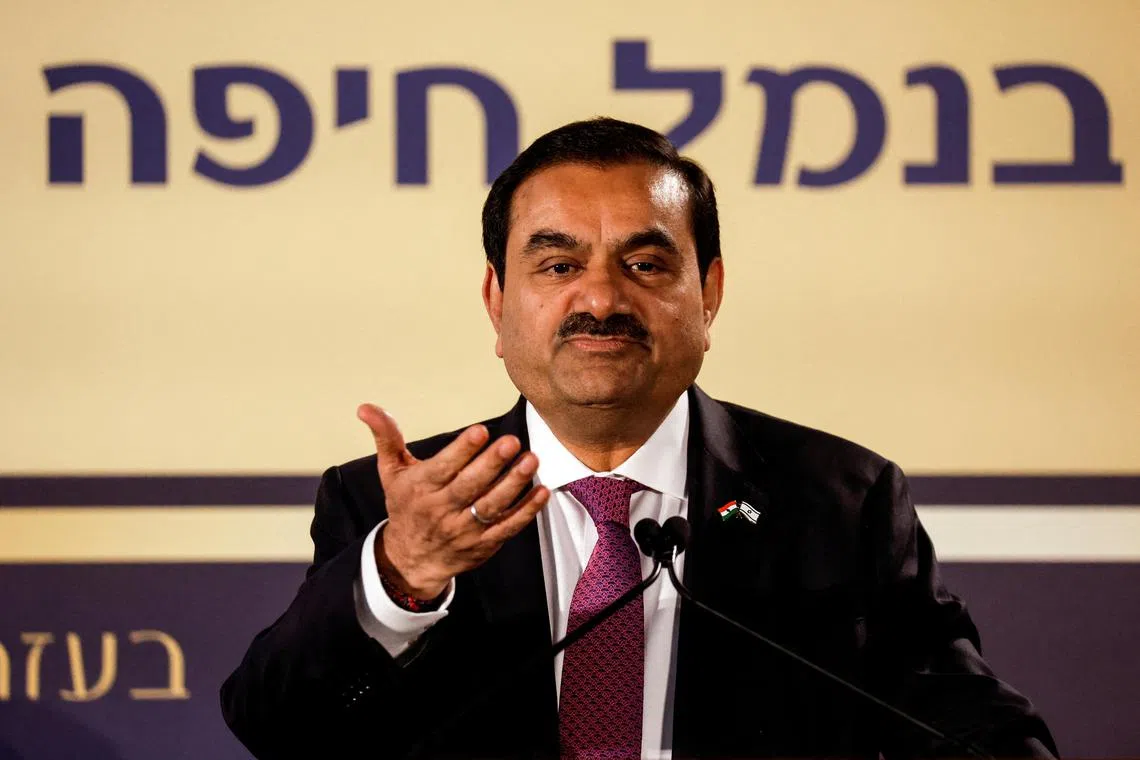Adani crisis deepens as stock rout hits $140 billion, bonds plunge to distressed levels
Sign up now: Get ST's newsletters delivered to your inbox

Critics say Mr Gautam Adani's political connections have helped his company win lucrative contracts.
PHOTO: REUTERS
Follow topic:
SINGAPORE – Billionaire Gautam Adani’s
Mr Adani, who last year became the world’s second-richest man with a US$147 billion fortune, has seen his own personal wealth plummet by around US$57 billion since Hindenburg accused his companies of fraud to inflate revenue and stock prices. After drawing money from the Middle East and other Indian billionaires to shore up a US$2.4 billion share sale, he then abruptly pulled it late Wednesday to protect investors.
The tumult has become a national issue with lawmakers disrupting Parliament to demand answers from Prime Minister Narendra Modi’s government, given how closely Mr Adani’s interests from ports to energy are intertwined with the nation’s growth plans.
The big worry looming over the conglomerate is that lenders and other counterparties will start to pare their exposure, while contagion fears spread to other parts of the markets.
While Mr Adani’s company has rebutted the claims and the billionaire himself said in a video speech on Thursday that the scrapped equity offering will have no impact on operations, the sell-off shows no signs of abating. Flagship Adani Enterprises plunged as much as 30 per cent on Thursday, adding to a 28 per cent tumble in the previous session.
In one sign of how risk perceptions are rapidly changing, the wealth units of Credit Suisse Group and Citigroup have stopped accepting some securities issued by Mr Adani’s companies as collateral for margin loans.
Other banks continue to lend against Adani debt. Bank of Singapore – OCBC Bank’s private banking unit – is continuing to offer margin loans for up to 70 per cent of the value of Adani dollar bonds, sources said earlier.
India’s central bank has asked lenders for details of their exposure to the indebted conglomerate, according to people familiar with the matter.
The Adani Group had touted its deep relationships with many local and international banks in its 413-page rebuttal of Hindenburg’s allegations earlier this week, with DBS Group Holdings included in its list.
“The biggest risk is if Adani Group faces a severe deterioration in access to financing, particularly at its highly leveraged entities,” Lucror Analytics’ senior credit analyst Leonard Law wrote in a note. “That said, the group can likely continue to raise funds from onshore banks and bonds for now.”
The extent of the damage to Adani’s empire may well depend on how Mr Modi’s government responds. The Prime Minister has so far stayed mum on Hindenburg’s allegations, while the minister for tech and railways told Bloomberg TV that the economy can withstand the rout in Adani shares. Mr Modi and Mr Adani are widely thought to be close, though the tycoon has in the past said he has not sought any political favours.
Hindenburg last week accused the Adani group of “brazen” market manipulation and accounting fraud, claiming that a web of Adani-family controlled offshore shell entities in tax havens were used to facilitate corruption, money laundering and taxpayer theft.
The conglomerate has repeatedly denied the allegations, called the report “bogus”, and threatened legal action.
“The fundamentals of our company are strong. Our balance sheet is healthy and assets, robust. Once the market stabilises, we will review our capital market strategy,” Mr Adani said in his video speech on Thursday.
The rout has dragged down the broader Indian market. The MSCI India Index, which includes eight of the group’s stocks, has dropped about 9 per cent from a December peak, inching closer to a technical correction. Eight of the 10 worst-performing stocks in the MSCI Asia Pacific Index this year are Adani-linked companies.
Two of the dollar bonds issued by Adani Ports and Special Economic Zone, maturing in 2027 and 2029, have both lost nearly 20 per cent since the US short seller released its report, according to Bloomberg-compiled data. Adani Green Energy’s September 2024 note has plummeted nearly 30 per cent.
Adani Group has US$34.7 million of coupon payments due this week on its dollar bonds.
Looking at valuations, “there could be more downside to the Adani Group shares”, said analyst Nitin Chanduka at Bloomberg Intelligence. “Banks could take a knock in case foreign outflows intensify and there is a default on bonds, but so far they haven’t missed interest payments.” BLOOMBERG

